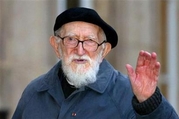
I begin with an ingenius "smiley" making a reverencial Sign of the Cross...Ever stop to think what you are wishing everyone to have a "Merry" of..? Not the Espanol "Feliz Navidad"...essentially "Happy Birthday" but rather a joyful Christ mass. What is the Mass?
There are those who think they cut Christ out of the picture by replacing Christ with an "X"...but the first letter of Christ in Greek is "X" and even when you say X-mas...you are still left with the Mass and what is the Mass?
Then there is the Christmas story, especially as it is found in the Gospel of Luke.
The Gospel of Luke begins and ends with a "vision of angels." First there is the appearance of the Archangel Gabriel to Zechariah and Mary. When Mary later visits Zechariah and Elizabeth she proclaims that God "has shown the might of his arm dispersed the arrogant of mind and heart. He has thrown down the rulers from their thrones but lifted up the lowly. The hungry he has filled with good things; the rich he has sent away empty,"(Luke 1:51-53) Zechariah at the birth of John prophesies "by which the daybreak from on high will visit us to shine on those who sit in darkness and death's shadow, to guide our feet into the path of peace" (Luke 1:78,79).
There is a common theme hinted at in both of these canticles, the lowly understand a message that those in power totally miss, hunger is filled, and those who sit in darkness are given light. These precede another vision of angels; in Luke 2: 8 immediately following the birth of Jesus we read about shepherds keeping "night watch" over their flocks, the shepherds are literally a people "sitting in darkness" who have an experience of light: "the glory of the lord shone around them.".
What is the message given to the shepherds? " "Be not afraid; for behold, I bring you good news of a great joy which will come to all the people; for to you is born this day in the city of David a Savior, who is Christ the Lord. And this will be a sign for you: you will find a babe wrapped in swaddling cloths and lying in a manger" (Luke 2: 10-12).
We may be overly familiar with this Christmas story to notice what it might be telling us. What exactly is a sign? It is not an end in and of itself but rather points to a greater reality. What is the sign the shepherds are told they will witness? They are told that they will find an "infant wrapped in swaddling clothes and lying in a manger." A manger is a feeding box for animals. We are told that it is a "sign", what they witness points to something beyond the experience of the birth of Christ to something else.
When the angels leave, the shepherds say, "Let us go, then, to Bethlehem to see this thing that has taken place, which the Lord has made known to us." The key phrase here is "Bethlehem" which literally means "house of bread". "Let us go to the House of Bread to see this thing that has taken place, which the Lord has made known to us."
All of this is how the Gospel of Luke begins, but how does it end? Here the Risen Christ has joined two disciples on the road to Emmaus. They do not recognize him and here they tell him about a "vision of angels" that the women who came to the tomb have reported to them. In response to this He opens the Scriptures to them. They invite Him to stay with them. He takes bread, says the blessing, breaks it, gives it to them, then physically vanishes from their site. Luke tells us quite blatantly, for the really dense reader, that they recognized Him in the "breaking of the bread".
Where are we to find Jesus this day? In the bread that is broken in the Eucharist! So at Mass we sing the Gloria, the message of the angels. It is both a reminder and an invitation for us to encounter the Lord here.
I have good news for you! This Christ Mass you too can get up and see what the Lord has made known to us--He is waiting for you.
I recommend also two books that I've written as the perfect Christ Mass gift to give, to remind and to inspire what we wish everyone to have a Merry one.
My How-To Book of the Mass for those who want to understand the Mass better and How to Get the Most Out of the Eucharist for those who understand but our bothered by the way they actually experience the Mass in their parish. Both will help you and your loved ones trek that trial of the shepherds this Christ-Mass.























